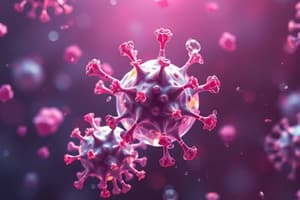Podcast
Questions and Answers
What is the primary reason for preferring macrolides over fluoroquinolones for treating Campylobacter?
What is the primary reason for preferring macrolides over fluoroquinolones for treating Campylobacter?
- Increasing resistance to fluoroquinolones (correct)
- Macrolides have a broader spectrum of activity
- Macrolides have fewer side effects
- Fluoroquinolones are more expensive
Why should antibiotics be avoided in patients with E. coli 0157:H7?
Why should antibiotics be avoided in patients with E. coli 0157:H7?
- To prevent interference with diagnostic testing
- To minimize the risk of precipitating Hemolytic Uremic Syndrome (HUS) (correct)
- To prevent development of antibiotic resistance
- To reduce the risk of allergic reactions
What is the primary treatment for Scombroid poisoning?
What is the primary treatment for Scombroid poisoning?
- Gastric lavage
- Antibiotics
- Corticosteroids
- Antihistamines (correct)
What is the primary advantage of tinidazole over metronidazole for treating Giardia?
What is the primary advantage of tinidazole over metronidazole for treating Giardia?
What is the most effective therapy for Cryptosporidiosis?
What is the most effective therapy for Cryptosporidiosis?
What is the primary consideration in evaluating a patient with chronic diarrhea (>4 weeks)?
What is the primary consideration in evaluating a patient with chronic diarrhea (>4 weeks)?
Flashcards are hidden until you start studying
Study Notes
Antibiotic Treatment for Bacterial Infections
- Macrolides are the preferred antibiotics for treating Campylobacter infections due to increasing resistance to fluoroquinolones.
- Antibiotics should not be given to patients with E. coli 0157:H7, as this can trigger Hemolytic Uremic Syndrome (HUS).
Treatment for Food Poisoning
- Scombroid poisoning is treated with antihistamines, such as diphenhydramine.
Treatment for Parasitic Infections
- Giardiasis is primarily treated with metronidazole.
- Tinidazole is a newer agent for treating Giardiasis, effective in a single dose.
- Cryptosporidiosis is treated with nitazoxanide, although its efficacy is limited.
- The most effective therapy for cryptosporidiosis is to increase the CD4 count to >100/mm3 using antiretrovirals.
Management of Viral Diarrhea
- There is no specific therapy for viral diarrhea.
- Patients are managed with fluid and electrolyte support until the infection resolves.
Differential Diagnosis for Chronic Diarrhea
- Consider the use of artificial sweeteners (get diet history) in patients with chronic diarrhea (>4 weeks).
- Giardiasis is a possible cause if the patient has been camping or exposed to children (e.g., daycare worker).
- If bloating and discomfort are relieved by bowel movement with no weight loss, consider Irritable Bowel Syndrome (IBS) and test for celiac disease.
Studying That Suits You
Use AI to generate personalized quizzes and flashcards to suit your learning preferences.



